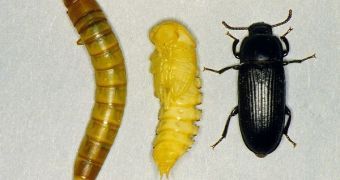This past Thursday, the scientific journal PLoS ONE witnessed the publication of a new study stating that, all things considered, livestock might soon be replaced by mealworms and superworms.
In other words, these generally despised creatures have the potential to become the beef and the chicken of the future, seeing how they constitute a major source of protein and are also significantly more environmentally friendly to farm.
These conclusions have been reached after specialists went through the trouble of comparing and contrasting the ecological footprint of growing such beetle larvae and raising livestock for meat.
The three parameters they took into consideration were land usage, energy needs and greenhouse gas emissions, Science Recorder explains.
They have found that, when used to grow mealworms, the same patch of land has the potential to produce more proteins than it would were it to be used for chicken, beef or pork.
“Since the population of our planet keeps growing, and the amount of land on this earth is limited, a more efficient, and more sustainable system of food production is needed,” argued Dennis Oonincx, a specialist presently working with the Wageningen University.
“Now, for the first time, it has been shown that mealworms, and possibly other edible insects, can aid in achieving such a system,” he went on to explain.
Interestingly enough, it seems that some stores are already marketing mealworms for human consumption, and those wishing to give them a try can purchase them freeze-dried, canned or alive. As well as this, several recipes are made available online.
Despite the fact that the process of growing these worms for food already has a relatively low environmental impact, the researchers hope that soon enough things will take an even greener turn.
“Further improvement of the mealworm production system by, for instance, automation, feed optimization or genetic strain selection is expected to increase productivity and decrease environmental impact,” Dennis Oonincx and fellow researcher Imke de Boer wrote in their paper.

 14 DAY TRIAL //
14 DAY TRIAL //